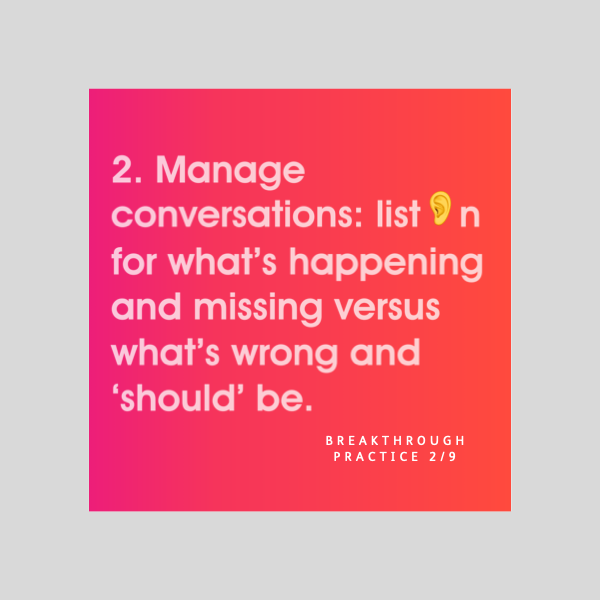Breakthrough Thinking Practice 2: Listen for what’s missing
Leadership Blog

Written by Achieve Breakthrough

---------------------------------------
Much in the same way a labourer cannot construct a building using only a hammer, leaders need a range of different practices in their toolkit in order to achieve breakthrough results.
This can sometimes mean shattering the shackles that tie us to our own human nature and shedding the behaviours that are hindering our journey towards breakthroughs. In this blog series we will unpack 9 mindset and behaviour practices for you to consider adopting if you want to set yourself on hyper-speed course to achieving extraordinary, breakthrough, results.
---------------------------------------
In the first post of this series we explored the importance of consciously unhooking ourselves from our, perhaps unconscious, assessments to focus more clearly on our commitments. In this blog, we will look at the second breakthrough practice of listening more precisely for "what's missing" versus what "should be."
As humans, we exist within the conversations that we have, and – contrary to the popular expression – a word paints a thousand pictures.
If someone asked you right now where your commitment is, how would you respond? Some might say it exists in their hearts and souls, and if you are a leader of people you might say it exists in the hearts of souls of your employees. But for a commitment to make an impact, it needs to exist within your dialogue.
If you want to know how well things are going within an organisation, just listen to the conversations that are taking place within it. Because our conversation is the organisation.
Facts vs interpretations: Which inspires action?
When you take part in conversations about an issue in your organisation you have two options – to focus on the bones of what has happened, or to focus on the story about it.
The latter takes a stance on how things “should be”.
This might manifest itself in conversations with remarks such as, “We should have had that meeting on Monday. It was cancelled and that’s why we’re behind.”
But time spent finding blame and thinking about how things "should be", or how they could have been, doesn’t change what’s actually happened.
A more powerful framing of these conversations is with an assumption that there is no way things should be. If a meeting didn’t happen on Monday, nothing can be done about that now because Monday has already happened.
To stay focused on our commitment, we need to get clear on what’s missing and essential, so we can agree our next action. By taking action, without judgement of the way things "should be", we give ourselves freedom to generate breakthroughs.
How to get what you want
That’s not to say that people can’t indulge in recreational complaining. But when it comes to committed complaining – when we want to take things in a different direction – we need to unhook from our assessments and focus on the action we want to take.
When we’re in this action-orientated mindset, we are more likely to analyse what’s actually happening around us and undertake proactive fact-finding.
Let’s say an employee’s line of thinking is, “I’d love to go to that strategy meeting but I never get invited, therefore they don’t want me there.” They aren’t only putting themselves down, they are allowing an interpretation (they don’t want me there) to lie across the road, blocking the way forward.
But what has actually happened? They haven’t been invited to a strategy meeting. That’s all. If they distill out the interpretation, there’s room to ask what action they can take. Have they ever asked to be invited? If they did ask what would happen? They might need to justify it - “I’d bring X to the table” - but they might just find themselves in that meeting.
Complaining almost always grows up in the soil of interpretation. Most of the time it’s just coiling like ivy around our ability to change the circumstances. To make a real change, we need to ask what the facts are so we find out what we’re missing and how we can get it. If we do that, we’ll always be taking action, and we’ll always be moving forward.
Working outside the rules of the system
We’re not saying we should invalidate people’s assessments or say they don’t matter. In some contexts they can matter a great deal.
The goal is not to avoid making assessments, either. Since if we did that, we would never have a view on anything and in some ways we would cease to be human.
The mischief happens when we get stuck in our assessments, wheels spinning, when we could be driving forwards towards a better future.
People that are new into a workplace often try to latch onto the sense of “how things should be in this organisation” as they wish to fit in. Similarly, experts who have been in a role for a long time might become set in their ways. But the quicker your people can learn to unhook from interpretations, the faster they can act.
Usually the leaders who work outside the rules of the system like this are those who rise to the top of the company. But when your entire organisation is managing their conversations, listening to what’s missing and taking action, ‘high performing team’ will be a conservative description of their abilities.
The new world
In this disruptive climate, it’s essential for organisations to be agile, innovative, and able to respond to markets in real time. “How things should be” is changing all the time, as markets are constantly changing. Our organisations need to be comfortable with reinvention. We can neither afford to hold onto old interpretations or go looking for new ones.
We can only really deal with how things are right now and react the best we can to that. A “how things should be” mentality is always trying to pull us back into a ‘predict and control’ convention - one that a number of us are comfortable with. But now more than ever we need to do away with conventional thinking and strive for breakthrough results.
Looking to create an impossible future? Get in touch to explore how we can help you ignite your ambitions.
Published 09/06/2022
Subscribe by Email
Achieve more breakthroughs. Get expert leadership ideas, insights and advice straight to your inbox every Saturday, as well as the occasional bit of news on us, such as offers and invitations to participate in things like events, webinars and surveys. Read. Lead. Breakthrough.
Tags
- Attracting talent
- Behaviour change
- Blended Learning
- Breakthrough Thinking
- Business partnering
- Career planning
- Change management
- Collaboration
- Communication
- Competitive strategy
- Creativity
- Decision making
- Developing middle management
- Developing millennials
- Developing talent
- Employee engagement
- Entrepreneurship
- High performing teams
- Hiring
- Human Resource Management
- Innovation
- Leadership development
- Learning technology
- Managing people
- Managing uncertainty
- Managing yourself
- Mergers & Acquisitions
- Mindset
- Motivating people
- Negotiation
- Organisational culture
- Organisational development
- Organisational values & purpose
- Performance management
- Productivity
- Programme Management
- Retaining talent
- Strategic thinking
- Strategy
- Strategy execution
- Succession planning
- Team development
- Work-life balance
Related posts
Leadership Blog
Why organisational agility starts with mindset, not operating models
Achieve Breakthrough | 17/02/2026
Leadership Blog
Curiosity as culture: The social glue of high-performing teams
Achieve Breakthrough | 10/02/2026
Leadership Blog
Why better questions build better teams: The cultural case for curiosity
Achieve Breakthrough | 03/02/2026
Leadership Blog
Leading with the handbrake off: Why curiosity is a strategic operating system for uncertainty
Achieve Breakthrough | 27/01/2026
